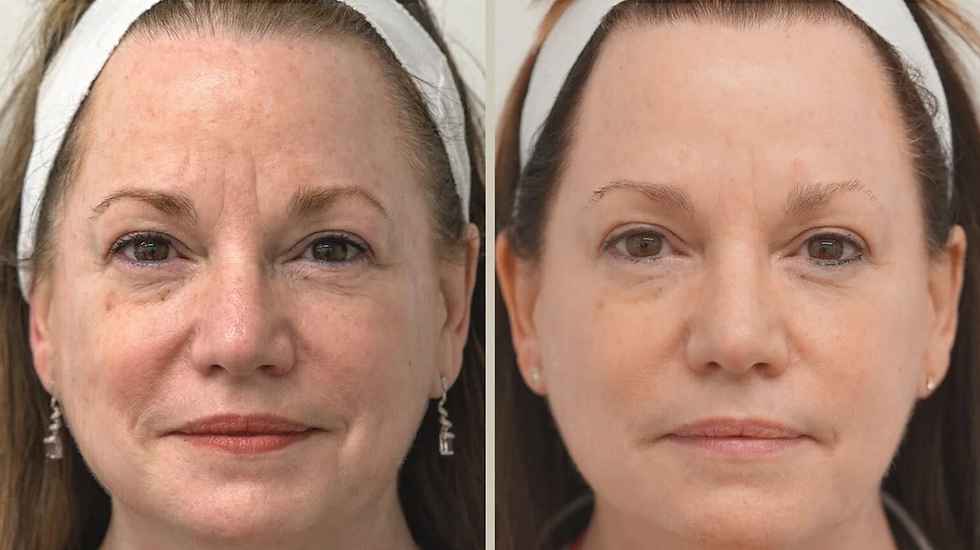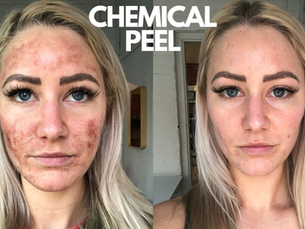
The Symptoms
Blotchy or Irregular Patches
Areas of the skin that appear uneven or mottled, with a mix of lighter and darker tones that don't blend naturally.
Yellow or Grey Undertone
A dull cast or uneven undertone that makes the skin appear tired, regardless of lighting or skincare use.
Shade Variation Across Face
Forehead darker than the cheeks? Chin lighter than the rest? Patchiness across zones is a tell-tale sign of tone imbalance.
Lingering Dark Spots
Post-acne marks or spots left behind after inflammation or skin trauma, especially common on medium to darker skin tones.
Discolouration Around Mouth or Eyes
Pigmentation changes often appear around delicate areas like the lips or eyes, creating contrast that’s difficult to conceal.
Uneven Tanning or Sun Damage
Sun-exposed areas show irregular darkening, with some spots absorbing more pigment than others — often unnoticed until the skin is bare.

Uneven tone often results from sun exposure, inflammation, hormonal shifts (like melasma), or post-acne marks. It’s your skin’s way of overproducing pigment in reaction to stress or damage.
While uneven tone is mostly aesthetic, it can signal underlying inflammation, sensitivity, or damage from UV or environmental exposure. A dermatologist can assess if there’s a deeper issue worth addressing.
Yes — at Manchester Dermatology Clinic, we tailor every treatment to your unique skin. Our consultants assess your skin type, Fitzpatrick level, and pigmentation history to safely personalise the protocol.
Some clients notice improvement after just a few sessions, while others may need longer depending on the depth and cause of the pigmentation. Expect progressive changes — not overnight transformation.
Not if maintained properly. Once we reduce the excess pigment, consistent sun protection, tailored skincare, and occasional top-ups help prevent it from returning.
Absolutely. Treatments can be combined with those targeting acne scars, texture, or dullness for a more even and radiant complexion overall.
Types of Treatments

Topical Treatments
01
Uneven skin tone is often a surface-level reflection of deeper imbalances — inflammation, sun exposure, or post-acne trauma. For many, a targeted skincare routine can begin to restore clarity without needing clinical intervention.
We prescribe custom topical solutions based on your skin type and pigmentation pattern. These may include brightening agents, antioxidants, and barrier-repair formulas — blended to reduce discolouration, strengthen skin integrity, and promote an even, healthy glow.
Every protocol is dermatologist-led and designed to improve skin tone gradually, safely, and without unnecessary irritation.

In-Clinic
Procedures
02
When uneven tone is stubborn, patchy, or pigment sits deeper in the skin, we offer advanced clinical treatments to accelerate results.
We use safe, precise technologies to break up areas of excess pigment and trigger skin regeneration — whether caused by acne scarring, melasma, or sun-induced damage. Treatment options may include controlled resurfacing, energy-based devices, or precision microneedling with infusion serums.
Our goal is more than just “lightening dark patches” — it’s restoring balance, tone harmony, and the natural radiance of your skin.

Holistic & Supportive Care
03
Uneven skin tone isn’t always just skin-deep. Hormonal shifts, inflammation, and even stress can disrupt melanin production — leading to blotchy, reactive pigmentation that topical treatments alone can’t fix.
We investigate the internal drivers of pigmentation through consultation, screening, or lab work when needed. This allows us to create a plan that addresses both the visible symptoms and the invisible triggers.
For those with melasma or pigmentation linked to hormonal changes, we may combine internal support with surface-level treatments — to deliver long-term results, not temporary masking.
Our Expert Dermatologist.
Our expert dermatology team combines medical excellence with a personalised approach.
Led by GMC-registered consultants, we bring years of experience in treating both complex skin conditions and delivering advanced cosmetic care. At Manchester Dermatology Clinic, you’re in the hands of trusted specialists who are dedicated to helping you feel confident in your skin.
Consultant Dermatologist
Dr. Sarah Quill

Dr. Quill is passionate about treating both medical and cosmetic concerns, from eczema and psoriasis to pigmentation and ageing skin.
Dermatology Practitioner
Syedehzahara

With a strong foundation in clinical dermatology, Syedehzahara provides expert support in diagnosing and managing a wide range of skin conditions.
Consultant Dermatologist
Dr.Morgan James

With over 15 years of clinical experience, Dr. James specialises in mole checks, skin cancer screening, and minor dermatological surgery.










